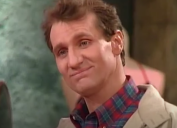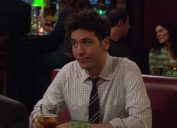7 TV Show Endings No One Understood
From Gossip Girl to The Sopranos, these finales led to endless debate among fans.
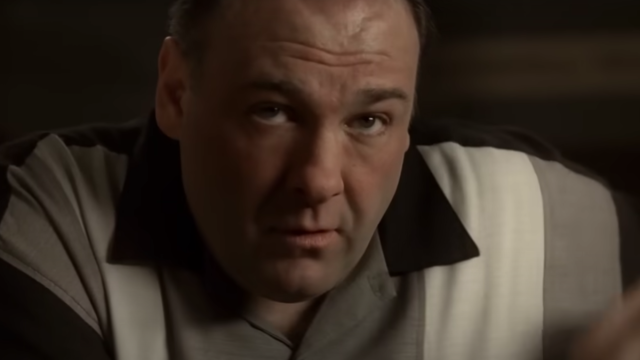
It's one thing to be disappointed by the series finale of a show. It's another to not even be sure whether you liked it or not, because you're just plain confused. While some shows attempt to tie up all the loose ends in their final episodes, plenty of series instead opt for major, last-minute reveals that make fans question everything that came before. "Why is the screen black?" "How could it possibly have been Dan?" and "The entire thing happened in a snow globe?!" are just some of the question the seven TV finales below left viewers asking.
Some of these finales remain obtuse. Others still have fans looking for clues to this day. And a few were confusing in the moment but later began to make more sense. Read on to see if you managed to make sense of these famously divisive series finales, and beware of spoilers.
READ THIS NEXT: The Most Hated TV Finales of All Time.
1
Gossip Girl
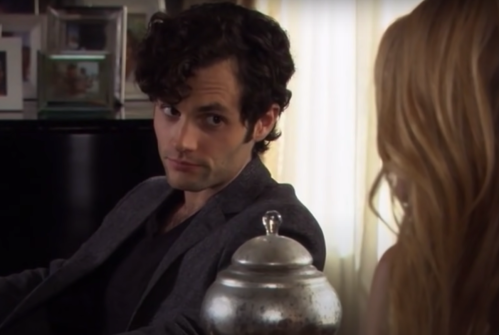
After six seasons, the Gossip Girl finale, which aired in 2012, finally revealed the true identity of the titular rumor monger… and it didn't make any sense.
The show landed on Dan Humphrey (Penn Badgley) being Gossip Girl the whole time, but as anyone who watched the teen drama all the way through will tell you, he couldn't have possibly known many of the secrets that were posted. It also means that he would have voluntarily shared terrible things about himself and his own family.
Gossip Girl creator Joshua Safran finally admitted in 2021 that Dan wasn't the person he had in mind for the blogger when he was working on the show. (He left after Season 5.) "I wanted it to be Nate [Chace Crawford], and it actually makes much more sense when it's Nate—even when it doesn't make sense," he told The Daily Beast, adding that the writers even threw in hints to Nate's secret identity.
2
Mad Men
The 2015 Mad Men finale saw Don Draper (Jon Hamm) in California, rather than his home of New York City. He meditates at a retreat with Stephanie (Caity Lotz), the niece of his friend—and widow of the soldier whose identity he'd taken—Anna, after working through some intense emotional baggage. Don smiles, then the show then cuts to the iconic "I'd Like to Buy the World a Coke" ad from 1971. Does this mean that he was the mastermind behind the commercial? It sure seems like it—and series creator Matthew Weiner has confirmed that take—but not everyone was sure what it meant when the last episode of Mad Men first aired.
And even if Don does create the campaign, does that mean he's still too focused on his job? Did he reach some sort of inner peace? Does he keep making the same mistakes over and over again like he always had? That's all up for debate.
3
St. Elsewhere
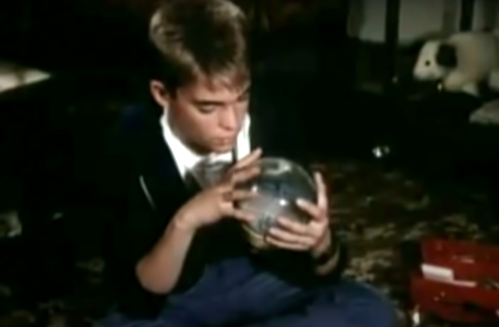
The 1988 conclusion of St. Elsewhere is on nearly every list of memorable (and game-changing) series finales. The medical drama ends with Tommy (Chad Allen), the son of the man audiences had gotten to know as Dr. Donald Westphall (Ed Flanders), staring into a snow globe. In this reality, Donald is a construction worker. He talks to his father about Tommy's autism and how he wonders what he's thinking about looking into the keepsake all day. It's then revealed that the snow globe has a tiny version of St. Eligius hospital inside. Basically, it reveals that the entire series and all of its characters were the product of one little boy's imagination.
Surprisingly, the series could have ended on an even more unexpected note. In a 2018 interview with Paley Matters, St. Elsewhere creator Tom Fontana revealed that he and the writers had sketched out many possible conclusions, including one in which the hospital is destroyed by a nuclear bomb. (Really.)
For more celebrity news delivered right to your inbox, sign up for our daily newsletter.
4
Lost
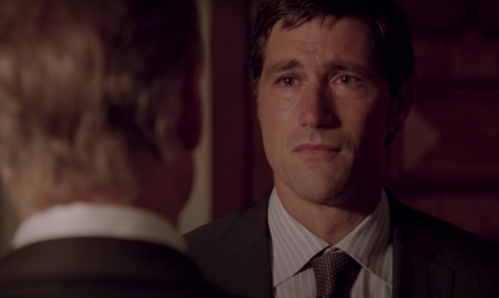
The 2010 series finale of Lost was highly anticipated, to say the least, by the fantasy show's fans, who had been picking apart every possible piece of evidence. In the season leading up to the last episode, the show introduces a "sideways" timeline, which shows what would have happened if Oceanic Airlines Flight 815 hadn't crashed and the survivors never ended up stranded. As that timeline plays out, characters "wake up" to the memories they somehow still have of the island and their relationships with each other. In the end, they all meet in a church after their respective deaths, ready to move on together.
Not only did this finale confuse fans who thought it might mean that the survivors had actually perished in the plane crash (they didn't), but it frustrated fans who simply wanted answers to some of the questions posed by the show's mythology. Looking back in an oral history for The Independent (via Collider), co-creator Carlton Cuse explained why they resisted simply tying up loose ends.
"When we started writing the finale, we were having breakfast in my office, and I said, 'Look there's no version of the finale that everyone is going to embrace, particularly with a show like this where there are so many mysteries,'" he said. "Early on, we arrived at the fact that trying to answer all the unanswered questions was a recipe for disaster. It was didactic and uninteresting and actually, just as [co-creator] Damon [Lindelof] has said, not true to life."
5
Seinfeld
When Seinfeld ended in 1998, it left some fans cold.
In the two-part finale, Jerry (Jerry Seinfeld), Elaine (Julia Louis-Dreyfus), George (Jason Alexander), and Kramer (Michael Richards) are on a private plane that's forced to land in a small town. While they're stranded there, the group violates a "good samaritan law" by neglecting to help someone in trouble and are put on trial. Many characters from the show's past are brought in to testify—which makes for a nice walk down memory lane—and the group is found guilty. The divisive final episode ends with them serving a year in prison, thereby being punished for being generally selfish people, as they are throughout the whole show.
Even Seinfeld himself doesn't 100 percent stand by that divisive ending, however. In a 2017 panel (as reported by Vulture), he admitted, "I sometimes think we really shouldn't have even done it. There was a lot of pressure on us at that time to do one big last show, but big is always bad in comedy."
6
Two and a Half Men
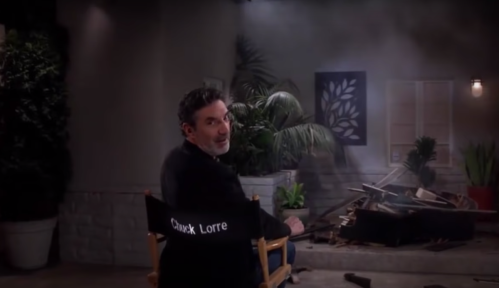
Two and a Half Men went through a rehaul when original star Charlie Sheen left after the eighth season amid a feud with series creator Chuck Lorre. Still, it continued on for four more seasons without him—until, that is, his character Charlie made a "cameo" in the finale.
In the last scene, Charlie (not played Sheen in this case), is approaching his former home when a piano is suddenly dropped on him, killing him instantly. (The title of the 2015 episode is "Of Course He's Dead.") Then, the fourth wall of the show is completely broken when Lorre appears on screen, watching everything play out from a director's chair. He utters Sheen's infamous catchphrase, "Winning!", before he's also crushed by a falling piano.
Obviously the former collaborators hadn't reconciled, but what else does that meta finale mean? Lorre explained to Entertainment Weekly that both men being crushed to death signifies that "perhaps nobody wins, but we hopefully, we laughed along the way."
7
The Sopranos
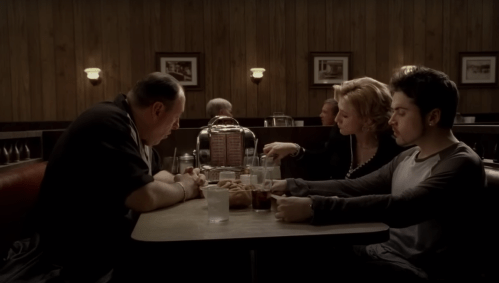
The mafia drama The Sopranos concluded in 2007 with an episode that's still heartily debated today. Leading up to the finale, several of his associates are taken out, and there is obviously a target on Tony's (James Gandolfini) back. In the final scene, he meets up with his family at a restaurant. As Journey's "Don't Stop Believin'" is playing, they arrive one by one, including daughter Meadow (Jamie-Lynn Sigler), who's parking her car outside. He hears the bell over the front door ring (indicating that someone has come in—but is it Meadow or an assassin?), looks up, and the screen cuts to black—the show suddenly over forever. Some fans have taken this to mean that Tony was killed right then. Others thought it meant that he'll continue living his life in paranoia, knowing it could end any second.
Creator David Chase resisted explaining the ending for years, but in 2021, he finally confessed to The Hollywood Reporter that Tony is, in fact, dead. As for why some viewers weren't satisfied by the cut to black, he said, "They wanted to know that Tony was killed. They wanted to see him go face-down in linguini, you know? And I just thought, 'God, you watched this guy for seven years and I know he's a criminal. But don't tell me you don't love him in some way, don't tell me you're not on his side in some way. And now you want to see him killed? You want justice done? You're a criminal after watching this [expletive] for seven years.' That bothered me, yeah."
